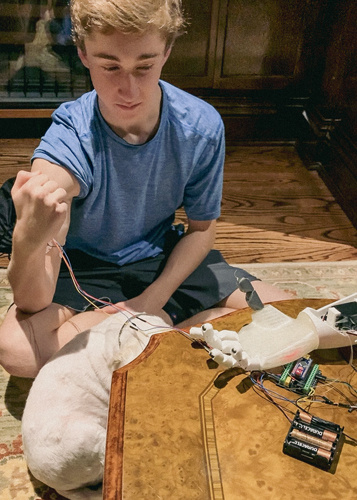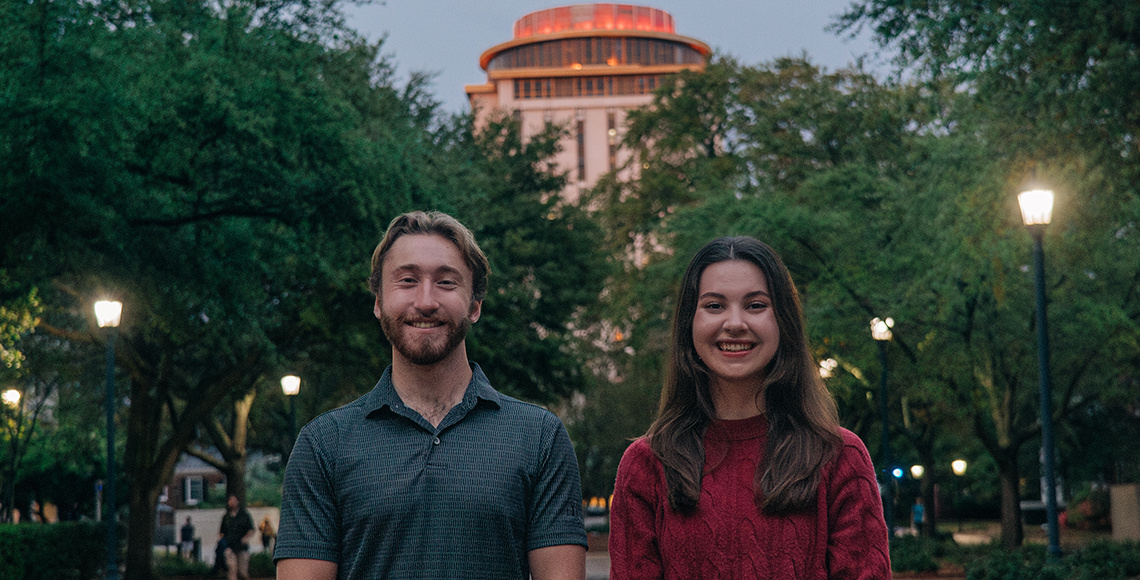Linden McGregor and Michael Pitre’s research careers were shaped by a global pandemic. For McGregor, whose interest in science piqued in her parents’ veterinary practice, Covid-19 canceled many of the labs in her AP biology class. When her teacher recommended an internship with the University of Kentucky, she jumped at the opportunity. McGregor worked in a university-level research setting, investigating a peptide called humanin that develops in muscle cells. The lab, led by professor Chintan Kikani, was investigating treatments for muscular disorders.
“By the end of that year, I was a lot more comfortable both in the lab and asking bigger questions in general about research,” McGregor recalls.
Meanwhile, in West Sayville, New York, Pitre was taking a different approach to research. As part of the Research in Science and Engineering (RISE) program, he was working on designing a prosthetic wrist from recycled plastics. Since the pandemic had canceled in-person learning, his teacher had to drop off the materials at Pitre’s home.
“I spent a lot of nights during quarantine in my basement, just tinkering with things that I didn’t really know, that I didn’t understand,” says Pitre. “It was cool because I kind of felt like Iron Man.”
These foundational experiences would spark a passion for undergraduate research with medical implications. From identifying targets for antifungal medications to investigating Alzheimer’s, these two University of South Carolina students are engaging in cutting-edge research. Their contributions to STEM disciplines have not gone unnoticed. The South Carolina Honors College students are the most recent additions to USC’s legacy of over 70 Goldwater scholars.
The Barry M. Goldwater Scholarship, established in honor of the Arizona senator in 1986, is the most prestigious STEM research award in the country. It recognizes outstanding sophomores and juniors who plan to pursue careers in natural science, mathematics and engineering research. In addition to the $7,500 scholarship, recipients join a community of scientists and scholars from across the country. McGregor and Pitre are among this year’s class of 441 scholars, selected from a nationwide pool of over 5,000 nominees.
Encouraged by mentors and challenged by pressing issues in their fields, McGregor and Pitre reflect the community of rigorous, high-impact research being conducted on campus. To learn about them is to learn about the faculty and staff who support them, as well as the scientific challenges that motivate them.
“I am thrilled that Linden and Michael have been selected as Goldwater scholars,” says Melissa Moss, professor of biomedical engineering and chair of USC’s Goldwater committee. “They are both talented researchers with compelling stories and impressive goals, and certainly deserving of this honor. I am excited to see where their future research pursuits and careers take them.”

Meet Linden McGregor
For Linden McGregor, a sophomore biochemistry and molecular biology major from Lexington, Kentucky, USC’s supportive community and the prestigious McNair Scholarship drew her to Columbia. She started researching in chemistry professor Caryn Outten’s lab during her first semester, building on the momentum she gained in high school. The group was investigating metabolic control of stem cell fate to better understand cancers and muscular disorders.
“She’s been wonderful,” says McGregor of professor Outten. “And beyond just in the lab. We meet up for coffee sometimes, and she’ll talk about having a career in research, things like that, where you don’t really get to know about it until you’re there sometimes.”
McGregor credits Outten and Shashini Maleesha Warahena Liyanage Dona, a graduate student in the lab, for helping her grow as a researcher and pointing her toward opportunities. In addition to the Goldwater Scholarship, McGregor has earned Honors College research grants and is now a research ambassador for the university — both opportunities that her mentors have encouraged her to pursue.
“Linden actively seeks opportunities to share her research, both to peers and to leading experts in the field, demonstrating a strong commitment to refining her communication skills and expanding her scientific knowledge,” says Outten. “Simply put, she is one of the brightest, most dedicated, and most promising undergraduate researchers I have had the pleasure of supervising... I’m excited to see how her research project develops over the next two years.”

When asked about the impacts of her research, McGregor lights up. Metal cofactors are present in many different processes within all organisms, including humans. Her research focuses on metals in fungal pathogens and how they impact infections.
“We want to figure out how we can target iron homeostasis and fungi, because fungi are very sensitive to iron levels, specifically because they have to compete with the hosts for those nutrients,” McGregor explains. “And so if we can target that, that impacts their virulence a lot.”
By targeting these metal cofactors, the Outten lab hopes that their work can lead to the development of effective antifungal treatments for some of the highest-priority fungal pathogens in the world. These treatments could particularly impact hospital patients and those with compromised immune systems.
It’s a tall order, but McGregor is eager to contribute. She hopes to uncover new structural features of important iron regulatory proteins to aid in the development of novel antifungal medications. The Goldwater scholarship application helped her refine her research goals, and she credits the process with helping her “connect where I am and where I want to be, drawing connections between the skills I have gained and my plans for the future.” McGregor aspires to earn a Ph.D. in biochemistry become a university professor.

Meet Michael Pitre
Fellow McNair scholar Michael Pitre, a third-year Baccalaureus Artium et Scientiae-MD (BARSC-MD) student from New York, has been fascinated by neuroscience for most of his life. “I love learning about how the three-pound organ that sits between our ears forms our thoughts, controls our movements and regulates our bodies,” he says.
While the accelerated path to a medical degree piqued his interest in USC, Pitre says that the on-campus atmosphere cemented his decision to move south. “I could tell that the friendly and supportive environment on campus would help me succeed,” he recalls. His predictions were correct: A class with professor Peter Vento sparked his interest in Alzheimer’s disease research.
“Our memories are really who we are, and they make up our personality, and I think Alzheimer’s disease is one of the scariest diseases out there,” says Pitre. “So it really made me want to try to develop something that can help people.”
Pitre researches with pharmacology, physiology and neuroscience professor Joseph McQuail at the USC School of Medicine. He’s investigating the D-serine molecule, which has important implications for memory and learning processes in the hippocampus. Alzheimer’s dysregulates the NMDA receptor signaling pathway that involves D-serine; Pitre hopes that he can target these dysregulated processes and develop therapeutics. Such developments would be a major advancement in Alzheimer’s treatment.
“Michael has made remarkable contributions to our Alzheimer’s research, particularly in uncovering how D-serine metabolism differs between normal aging and AD pathology — insights that inform how we understand and may one day treat memory loss in aging populations,” says McQuail. “His work has shaped our ongoing experiments using animal models, and he approaches every challenge with curiosity, clarity and commitment. Even at this early stage, he’s conducting research with clear potential for future clinical and translational impact in brain health and aging.”

Pitre also conducts heart-related research in exercise science professor Mark Sarzynski’s lab. His current project concerns the effect of exercise on atherosclerotic cardiovascular disease, which has major public health implications. Pitre attests that the “iterative process” of research — asking questions, learning from mistakes — is what keeps him motivated. He almost talked himself out of applying for the Goldwater Scholarship, but with encouragement from his research mentors and USC’s Goldwater faculty committee, Pitre became the first BARSC-MD student to earn the scholarship.
As a physician-scientist in the making, Pitre’s work in medical research will prepare him to bring a knowledge of cutting-edge medical innovation to his patients.
“My long-term goal is to have that 50-50 split between half my time being in the O.R. doing procedures and doing surgeries, that saves individual lives, and then half my time in the lab trying to develop therapeutics that will help more people on a wider scale.” Pitre plans to earn an M.D./Ph.D.
Beyond biology and the brain
When McGregor and Pitre aren’t in the lab, they’re encouraging others to engage in research. McGregor serves as a Magellan Ambassador, representing the Office of Undergraduate Research. In this role, she contributes to USC’s thriving research community, giving presentations that encourage her peers to pursue research on campus. She also volunteers with Dream Outside the Box, a weekly activity-based program that introduces elementary students to career exploration and future academic endeavors.
Inspired by his experiences as an EMT, Pitre contributes to the campus community as the co-founder and co-president of Gamecock Emergency Medical Students. This organization finds training opportunities for USC students in areas related to emergency medicine and improves emergency preparedness. Pitre is also the event management and student relations chair of MedElem, a USC student group dedicated to helping elementary school students learn about healthcare and health-related careers.
Their advice to other USC students about getting involved in undergraduate research? Have patience and pursue something exciting.
“P.I.’s are not as scary as you’d think,” says McGregor. “But you don’t need experience to be involved. You just have to be curious. Even if they say no, the worst they can say is no.”
“I think a lot of people, especially pre-meds, think that you have to do research, and then they they’ll just go for the first opportunity that comes along and then they wind up in a lab and then are just like, ‘I hate it here. I don’t want to do this,’” says Pitre. “But research is about pursuing something you’re passionate about and that you want to learn more about.”
